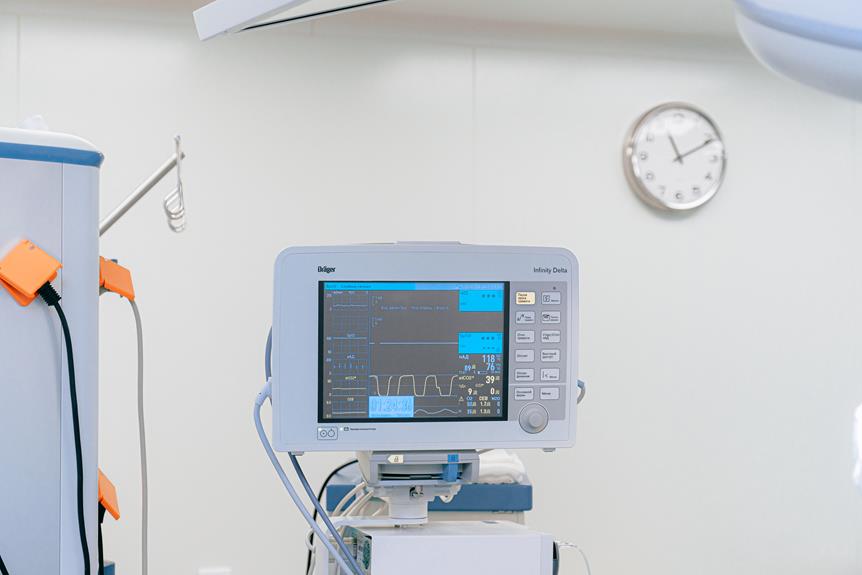Hernia Mesh Bowel Obstruction Leads to 2 Emergency Surgeries
In an unfortunate twist of fate, a patient underwent two emergency surgeries due to severe bowel obstruction caused by hernia mesh adhesion. Initially mistaken as potential abdominal cancer, it underscored the dire need for accurate diagnosis and effective treatment plans. This article explores the patient's harrowing journey, bringing to light the serious complications associated with hernia mesh, thereby advocating for patient safety and rights.

Key Takeaways
- Hernia mesh can cause bowel obstruction.
- Symptoms of bowel obstruction caused by hernia mesh adhesions include nausea, weakness, and inability to eat.
- Surgery is required to remove the mesh and unkink the bowel.
- Hernia mesh removal surgery is a relief compared to cancer.
Understanding Bowel Obstructions
To fully comprehend the complexity of this medical scenario, one must first understand what a bowel obstruction entails and how it can critically impact an individual's health. A bowel obstruction, simply put, is a blockage that prevents solids or liquids from passing through the digestive tract. The causes of bowel obstruction can be multiple, but in the case of this particular patient, a hernia mesh was the culprit. Complications of bowel obstruction can be severe, ranging from dehydration and malnutrition to bowel perforation and sepsis, conditions that can be life-threatening. Hence, immediate medical attention is imperative, and understanding bowel obstruction causes and complications can help in recognizing the condition early and seeking appropriate treatment.
The Role of Hernia Mesh in Surgery
Hernia mesh, a common surgical implant, plays a crucial role in hernia repair surgeries, and its application and potential complications are essential to understand in the context of bowel obstructions. The role of hernia mesh in surgical repair is to provide support to the weakened or damaged tissue. It is generally designed to stay in the body indefinitely, offering long-term reinforcement to the repaired hernia site. However, complications arising from hernia mesh usage have been noted. These include infection, hernia recurrence, and adhesion. The latter refers to the mesh sticking to the intestines, causing a blockage or bowel obstruction. Such complications might necessitate additional surgeries, which bring their own set of risks and challenges.
Case Study: Two Emergency Surgeries Due to Hernia Mesh
While we have broadly discussed the potential complications of hernia mesh usage, focusing on a specific case study will provide a more detailed understanding of how a patient underwent two emergency surgeries due to hernia mesh-induced bowel obstruction. The patient, having previously opted for hernia mesh placement, began experiencing severe abdominal pain and related symptoms. A CT scan revealed an obstructed bowel, requiring immediate surgical intervention. Surgeons discovered the mesh had adhered to the patient's bowel, causing the obstruction. Post-surgery, the patient faced a second emergency procedure to correct further complications, illustrating the long term effects of hernia mesh complications. This case underscores the importance of considering surgical alternatives to hernia mesh, given the potential for serious complications.
Symptoms and Diagnosis of Bowel Obstruction
Recognition of the symptoms and accurate diagnosis of bowel obstruction are vital steps in ensuring timely and effective treatment. Symptoms often include severe abdominal pain, bloating, vomiting, and inability to pass gas or bowel movements. These can be triggered by various causes and risk factors, such as hernia mesh adhesions. Diagnostic methods range from physical examinations to imaging tests like CT scans. When bowel obstruction is confirmed, immediate attention is required to prevent severe complications. While surgery is often necessary, especially in cases of complete obstruction, alternative treatment options like medication or non-invasive procedures may be considered in less severe cases. However, each treatment plan is individualized, depending on the patient's condition and the underlying cause of the obstruction.
The Link Between Hernia Mesh and Bowel Obstructions
Drawing upon extensive medical research and patient experiences, it becomes clear that the use of hernia mesh in surgical procedures can lead to bowel obstructions, and in severe cases, necessitate additional emergency surgeries. This correlation arises from the potential risks associated with mesh integration into the body, such as adhesion or migration of the mesh. These complications may constrict or block the bowel, causing severe discomfort and health risks. Despite its benefits in hernia repair, these risks underscore the importance of discussing alternative treatments with patients. While hernia mesh can be effective, it is not without potential complications. Considering alternative treatments, such as sutures or biological tissue meshes, may offer a safer option for certain patients in reducing the risk of bowel obstructions.
Treatment Options for Hernia Mesh Bowel Obstructions
Various treatment options exist for patients experiencing hernia mesh bowel obstructions, ranging from conservative management techniques to more invasive surgical interventions. The choice of treatment depends on the severity of the obstruction and the patient's overall health.
Potential treatments include the use of medications to decrease inflammation and relieve symptoms, dietary changes to help ease digestion, and the use of nasogastric tubes to decompress the bowel. However, in severe cases where the obstruction is causing significant discomfort or risk to the patient's health, surgical options may be required. This may involve removing the obstructing mesh or performing bowel resection. As with any treatment, the benefits must be weighed against potential risks and complications. It's crucial for patients to discuss these options thoroughly with their healthcare provider.
The Surgery Process: What to Expect
While the prospect of undergoing surgery for hernia mesh bowel obstruction can be daunting, understanding the steps involved in the procedure can help alleviate some of the anxiety associated with this treatment option. The surgical process typically involves the removal of the obstructing mesh, and, at times, a portion of the bowel that may have been damaged. The surgeon may also need to repair the hernia site. Post-surgery, patients may face recovery challenges such as pain, discomfort, and dietary restrictions. However, these are generally temporary and manageable with appropriate care and medication. Long term outcomes of the surgery are generally positive, with most patients experiencing a significant reduction in symptoms and an improved quality of life.
Post-Surgery Complications: A Deep Dive
In the aftermath of surgery for hernia mesh bowel obstruction, an exploration into the realm of potential post-operative complications reveals a variety of challenges that patients may encounter. This necessitates an effective approach to complications management. These complications can range from infection, hernia recurrence to chronic pain. There may also be long term effects such as adhesion formation, which can lead to bowel obstruction. These adhesions may not manifest immediately post-surgery, but can cause significant discomfort and complications in the future. It's important to note that effective complications management includes regular follow-ups, immediate attention to symptoms, and in some cases, subsequent surgical interventions. Understanding these complications and their long term effects is crucial for patients to navigate their post-surgery journey.
Patient Recovery and Quality of Life Post-Surgery
After undergoing two emergency surgeries, patients often grapple with the journey of recovery and the impact on their quality of life post-surgery. The process of patient rehabilitation requires endurance, patience, and a strong support system. Physical discomfort, changes in daily routines, and the psychological strain of readjusting to life after surgery can be quite challenging. The long-term effects of such surgeries, particularly related to hernia mesh bowel obstruction, can be a cause for concern. These may include persistent pain, recurrence of the hernia, and sometimes, complications leading to further surgeries. However, with adequate medical care, personalized rehabilitation plans, and robust emotional support, patients can reclaim their lives and improve their quality of life post-surgery.
Legal Remedies for Hernia Mesh Complications
Navigating the legal landscape for hernia mesh complications can be complex, but it is an essential step for victims seeking compensation for their suffering and financial losses. The process involves identifying the manufacturer of the faulty mesh, determining the nature of the injury, and establishing a link between the mesh and the harm caused. Legal compensation can cover not only medical expenses but also pain, suffering, and lost wages. Patient advocacy groups can offer invaluable support, guiding victims through the legal process and ensuring that their rights are protected. It's crucial to consult with an experienced attorney who specializes in such cases to maximize the chances of a successful claim.
The Importance of Medical Follow-Up
Regular monitoring and prompt medical follow-up play a critical role in managing potential complications from hernia mesh surgeries, and they can significantly improve a patient's prognosis. Through a structured follow-up, medical professionals can detect and address issues, like bowel obstruction, early on, thereby preventing complications that could lead to emergency surgeries. Patient education forms a crucial part of this follow-up process. By educating patients about potential signs of complications and the importance of regular check-ups, they can be made active participants in their own healthcare journey. This proactive approach not only serves to improve patient outcomes but also empowers patients to take charge of their health, reinforcing the importance of medical follow-up in the post-surgical care of hernia mesh patients.
A Closer Look at Hernia Mesh Manufacturers
Several hernia mesh manufacturers have been implicated in producing potentially defective products that may contribute to serious complications such as bowel obstruction. These manufacturers are now subject to numerous hernia mesh lawsuits, filed by patients who have suffered severe health consequences. The complications and risks associated with hernia mesh are wide-ranging; however, bowel obstruction is among the most serious. This condition often requires emergency surgical intervention and can potentially be life-threatening. The high incidence of hernia mesh complications has led to calls for greater scrutiny of manufacturers and their products. It is crucial that patients are made aware of the potential risks before undergoing hernia repair surgery, to ensure they can make an informed decision about their treatment.
Tips for Preventing Future Bowel Obstructions
After enduring the ordeal of bowel obstruction and subsequent surgeries, it is paramount that patients adopt preventive measures to avoid future obstructions, and this includes both lifestyle modifications and careful post-surgical care. Adopting a high-fiber diet, maintaining regular physical activity, and proper hydration could help facilitate bowel movements, thus preventing complications resulting from obstructions. Equally essential is adhering to post-surgical care instructions, such as avoiding heavy lifting, allowing the body ample time to heal, and immediate consultation with healthcare professionals if symptoms recur. These actions can significantly mitigate the long-term effects of bowel obstruction. By taking these steps, patients can actively contribute to their healing process and potentially prevent future obstructions.
Personal Stories: Living With Hernia Mesh Complications
In the world of medicine, the use of hernia mesh has been both a boon and a bane, and to understand this paradox, we turn to the stories of individuals who have lived with hernia mesh complications. Patient testimonials provide firsthand insights into the challenges and complications associated with hernia mesh. For instance, John, a 45-year-old engineer, had two emergency surgeries due to bowel obstruction caused by hernia mesh adhesion. His ordeal underscores the importance of discussing alternative treatment options with healthcare providers. Similarly, Mary, a 61-year-old retiree, experienced chronic pain post hernia mesh surgery, leading to a diminished quality of life. Their experiences underscore the necessity for comprehensive patient education and exploration of all available treatment options.
The Future of Hernia Mesh: Innovations and Improvements
While the past and present of hernia mesh have been fraught with complications and legal issues, the future holds promise with the advent of innovations and improvements in the medical field. Future advancements in biomaterials and surgical techniques are expected to reduce the incidence of complications associated with hernia mesh. For instance, the development of meshes with better biocompatibility and minimized foreign body response is on the horizon.
Patient testimonials play a key role in driving these advancements. By sharing their experiences, patients provide invaluable insights which aid in the refinement of existing products and the creation of new ones. Their voices are instrumental in shaping a future where hernia mesh is safer and more effective. The goal is clear – to optimize patient outcomes and ensure a better quality of life post-surgery.
Frequently Asked Questions
How Is the Quality of Life Affected for Patients Who Undergo Multiple Surgeries Due to Hernia Mesh Complications?
Patients experiencing hernia mesh complications often undergo multiple surgeries which can significantly impact their quality of life. Postoperative recovery can be prolonged and strenuous, leading to physical discomfort and emotional stress. Additionally, the financial burden of repeated medical procedures can cause substantial economic strain. These factors combined can negatively affect the patient's overall wellbeing and lifestyle, making it crucial to address hernia mesh complications promptly and effectively.
Are There Any Alternative Treatments Available Apart From Surgery for Hernia Mesh Bowel Obstructions?
Alternative treatments for hernia mesh bowel obstructions are limited, primarily due to the physical nature of the complication. Non-surgical interventions may include dietary modifications or medication to manage symptoms. However, these are not permanent solutions. Current research is focusing on mesh material analysis to develop safer, less reactive materials. Ultimately, surgical removal or adjustment of the mesh is often necessary to fully resolve the obstruction and associated symptoms.
Can Hernia Mesh Complications Lead to Long-Term Health Issues, and if So, What Are These?
Yes, complications from hernia mesh can lead to long-term health issues. These may include chronic pain, infection, and bowel obstruction. Mesh material analysis is crucial in these cases to understand the cause of complications. Additionally, patients may need to make post-surgery diet changes to facilitate recovery and prevent recurrence. It's important to consult with a healthcare provider for personalized advice and treatment strategies.
What Are the Psychological Impacts of Dealing With Hernia Mesh Complications and Subsequent Surgeries?
Dealing with hernia mesh complications and subsequent surgeries can significantly impact a patient's psychological well-being. It's estimated that up to 33% of such patients may experience emotional distress, including anxiety and depression. These challenges highlight the importance of emotional coping strategies and robust support systems. The emotional toll can be mitigated by comprehensive care approaches, including psychological counseling and family support, affirming the importance of a holistic approach in managing such health crises.
How Do Medical Professionals and Legal Experts Determine if a Hernia Mesh Manufacturer Is Liable for Bowel Obstructions Caused by Their Product?
Medical professionals and legal experts determine hernia mesh manufacturer's liability through a comprehensive process. This includes a thorough Mesh Material Evaluation to identify any defective design or manufacturing issues. The Liability Determination Process involves evaluating whether the manufacturer provided adequate warnings about potential risks. They also consider if there's a direct link between the product and the bowel obstruction, and if the manufacturer could have used a safer alternative design.
Conclusion
Ironically, hernia mesh, designed to repair and heal, has caused more harm for some, leading to life-threatening complications such as bowel obstructions. As patients grapple with the aftermath, medical professionals and manufacturers must confront the hard questions about the safety and efficacy of hernia mesh. Meanwhile, resources like Drugwatch.com continue to empower patients, advocating for their health and rights. The future demands not only improved hernia mesh design but an unwavering commitment to patient safety.

This post has been generated by AI and was not reviewed by editors. This is Not legal advice. Please consult with an attorney.




